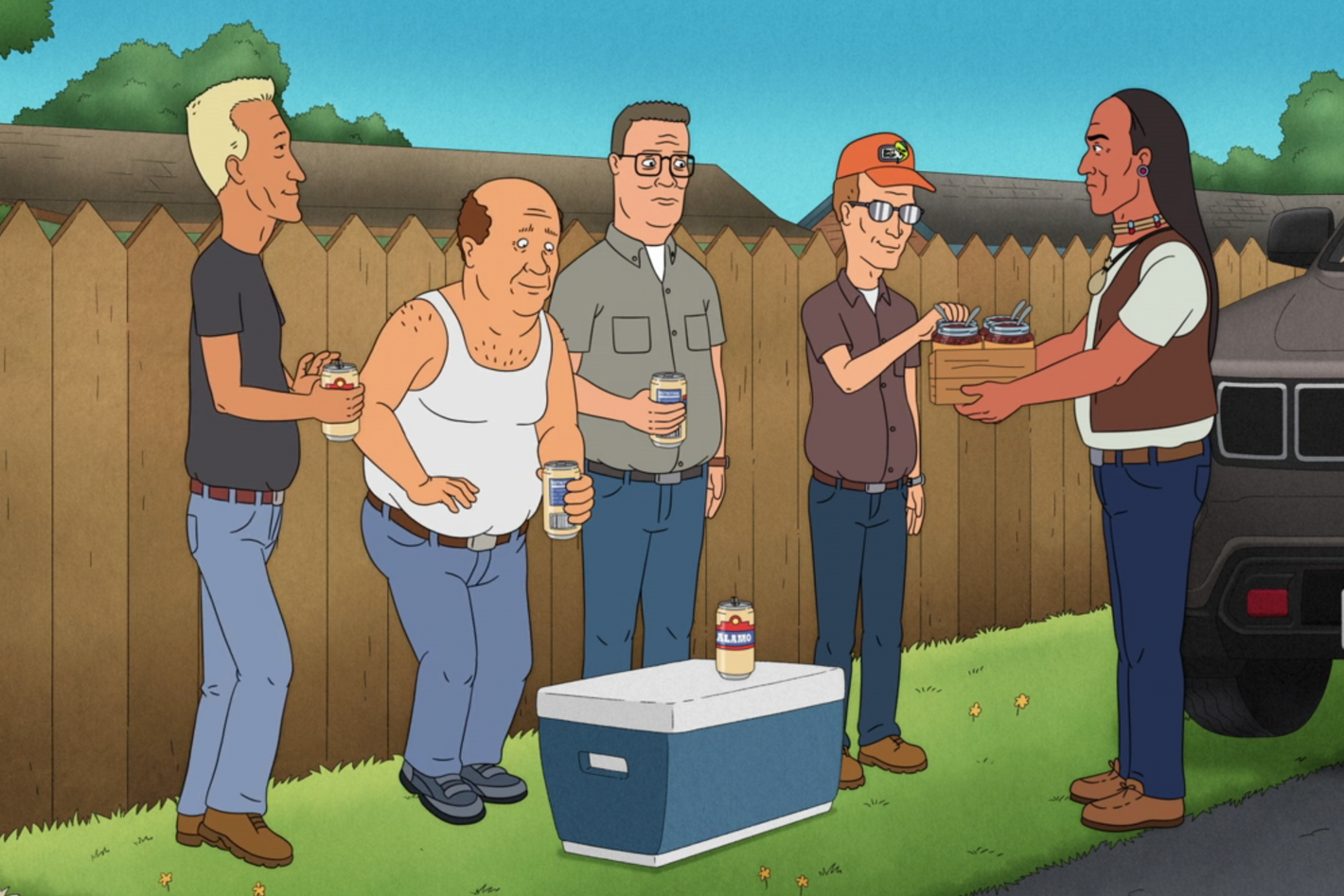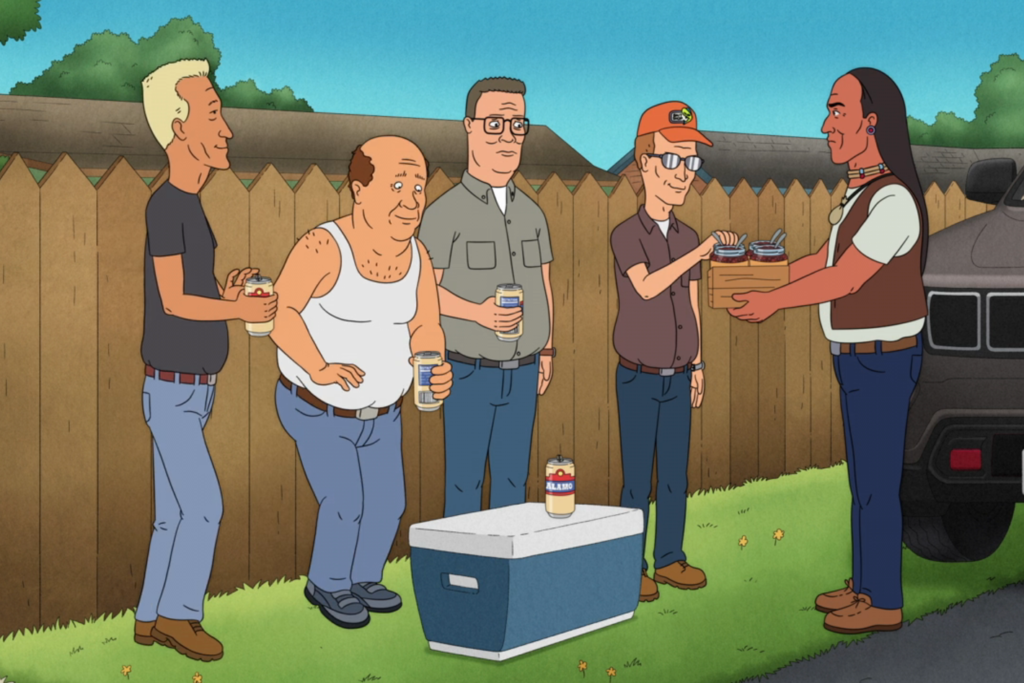
Right about now, you’re probably realizing how short a ten-episode season of King of the Hill feels. I’ve praised this revival for avoiding streaming runtime bloat and sticking to 25-minute episodes, but at the same time, it has succumbed to streaming season-order shrinkage, and that’s a bummer. There are reportedly ten more episodes on the way, though it’s unclear to me whether they’ll be positioned as a 15th season or a “part two” of this one. Either way, though, this group of episodes concludes feeling a bit like a half-season, exacerbated by the fact that “A Sounder Investment,” while far from a bad episode, plays more like a midseason entry than a finale.
At least that’s the case with the older generation’s hog-hunting A-story, which feels like it could have been ported directly over from any point during seasons eight through 11, save for a few small updates (and of course the absence of Lucky and Luann, still unacknowledged). Bobby and Connie’s first steps into official coupledom, however, puts a satisfying capper on their reunion arc this season, and leaves me very excited for where these two go next. And I suppose the reintroduction of a retired, seemingly reformed Buck does provide an answer of sorts to the season-long mystery of why Hank left Strickland Propane for Aramco, though there are still a lot of gaps left to fill in about what all of these characters, but the Hills especially, experienced during the time jump.
That said, I appreciate King of the Hill treading lightly when it comes to filling in the backstory. The premiere was the weakest episode of the season in large part because it had so much business to attend to in that regard, while my favorite episodes of the revival so far are the ones that build on the new status quo without straining to explain it. “A Sounder Investment” falls somewhere in the middle, with a Rainey Street Gang story line that feels like classic KOTH with a few updates, and a Bobby-Connie story line that, despite being explicitly about nostalgia for the old seasons, feels distinct to this new era of the show.
The stuff with Boar No More, née Boom Boom Pig LLC, is a nice way to blend all of Hank’s important non-Bobby adult relationships: to his wife, to the guys, and to Buck Strickland. (Plus a little bit of John Redcorn, but he ends up being more of a framing device than a plot focus, which is disappointing given this episode’s closing gut-punch.) And pinning all of it on Hank and Peggy’s retirement-fund investments allows KOTH to engage with an established Hank character trait — his aversion to risk, especially of the financial variety — in a slightly different context. Buck in particular adds an interesting twist here, given his history with exceedingly risky behavior, which he appears to have put behind him in retirement … until Hank appears to ask the most successful businessperson he knows what to do about a too-good-to-be-true investment opportunity that causes Buck’s pulse monitor to spike. “Makes my blood boil to think a simple, honest man like you almost got fleeced,” Buck explains, right before turning around and fleecing that simple, honest man.
Buck, still being a jackass upon his return, maintains the comedic conceit of Hank looking up to a man who deserves little to no respect, but removes the sometimes unpleasant stench of subservience by making him no longer Buck’s paid employee. It also aligns Buck with Peggy, as well as the alley guys, against Hank, a character arrangement I don’t recall ever seeing before now, and which puts an interesting wrinkle in the ol’ “Hank is right and/or fixes everything” plot. Hank is steadfast in his opinion that throwing in with Boomhauer’s increasingly speculative hog-killing endeavor is foolish, a stance that’s much easier for him to take when it’s just his friends and Peggy doing it; their histories speak for themselves. Even when Cindy Carrington, from community development, and Conner from accounting, enter the picture, Hank feels pretty secure in his position that “Every team needs a guy to watch from the stands, without putting his money in.” But once Buck comes on board, he sends both Boar No More’s futures and Hank’s insecurity soaring by selling the two-week-old company to the biggest publicly traded pig eradication company in the Southwest, tripling Peggy’s investment. Hank claims to be at peace with his decision even in the face of Buck’s four-wheel-drive founders’ gifts and the ecstatic cha-cha-chinging of Dale (and Nolan Ryan), but never have Hank’s slow-and-steady tendencies seemed more out of step with the times.
One fateful bathroom break later, and it turns out Hank was indeed right, but he did not fix everything. In fact, he made things worse, throwing away his and Peggy’s retirement dividends in a moment of weakness right before the Pig Force stock plummeted. Lucky for Hank, his insistence that all this growth was happening too fast got through to his wife just in time for her to sell her shares, allowing Peggy to be the one who fixes everything this time, while affirming Hank’s rightness in the process. That feels like an appropriate split between the co-owners of Hill Family Inc., and the newest investors in John Redcorn’s Red Corn, with a projected operating profit margin of 38 percent.
Slow and steady has also proven to be a winning strategy for Bobby and Connie’s renewed relationship. Relatively speaking, of course — as noted, this is a short season, and the two of them only share screen time in six episodes. But there’s been a real sense of purpose and patience to the way these two have made their way back to a relationship that is in some ways unchanged from when they were kids, but also completely different. “A Sounder Investment” acknowledges that directly with Bobby and Connie’s respective attempts to recapture their youth as they go out on their first official dates as more-than-just-friends. First, Bobby takes her to a classical concert, not realizing that she gave up playing violin shortly after learning Beethoven’s extra-long Concerto in D, which neither of them can stay awake through — Connie because she’s up all night studying, Bobby because he’s up all night peeling garlic. Joseph is delighted to hear that the two “slept together” on the first date, but is characteristically confused.
Luckily, Connie also realizes the date was a bust and tells Bobby they need to do something “more us,” so she plans an even more explicit reference to their past with a visit to an indoor trampoline park. But just as these two were unable to stay awake through their first date, their adult bodies aren’t cut out for this trip down memory lane, either. I like how both of these developments scan broadly as a result of them being older than they were when they dated as kids, but without suggesting these 21-year-olds are actually old. “Are you a giant kid, or a weird adult?” asks the brat, who then proceeds to throw himself into Bobby and Connie mid-romantic jumping, dislocating Connie’s shoulder in the process. As Bobby says, they’re neither, but that’s left their relationship in an undeniably weird place.
That comes through loud and clear when Bobby “good food can solve any problem” Hill buys a bunch of his girlfriend’s favorites from the hospital cafeteria, only to realize they’re actually the favorites of a 12-year-old. With the aid of a malfunctioning credit card reader, he realizes the two of them have “a connection problem,” but when he tries to talk to Connie about it, he learns that there’s something other than food that can solve any problem, or at least this one: drugs. Specifically, the painkillers that allow Connie to admit, slurringly, that while she loved the old Bobby, she really likes this one too, enough to plant a big one on him and tell him to get his cute butt into her hospital bed. Over the pudding cup she’s delighted to see he brought her, the two of them quit reminiscing and start sharing what’s exciting to them as they are right now: Connie’s mind is blown by “the shit they’re doing in Korea” with quantum dot emitters, and Bobby feels the same way about his experiments in kimchi and samgyeopsal. It’s been so fun seeing these two reconnect over their past, but this episode, and this season, makes me even more excited to see what Connie and Bob (!) get up to together in the future. Let’s hope those next ten episodes include a trip to South Korea.
Musings
• The closing memorial to Jonathan Joss, who was murdered two months before this season premiered, is an absolute heartbreaker, though it being the final beat of this episode feels a little off. Sending Joss’ character off on a gag about Hank being suspicious of John Redcorn, wife-stealer, isn’t offensive per se, but am I wrong that putting it after his appearance as Switzer and Joseph’s savior in episode five would have been much more heartwarming?
• At least John Redcorn gets in a good dig at Hank as well, saying it’s fine if Hank wants to help with his invasive pig problem by mending fences and setting traps, because “there’s no shame in gathering while the other men hunt.”
• Hank can at least admit that Boom Boom Pig LLC is a better idea than Dale’s Uber for dogs: “If a dog can guide a man across the street, why can’t he drive a car?”
• I appreciate how this season has codified Hank’s dislike of guns and shooting, first with the nail-gun-safe gag in episode eight, and then here with his attempts to trap the hogs rather than kill them, which begins as a callback to him being a terrible shot, but pays off nicely when Peggy and the guys use their new SUVs to help round up the pests rather than eradicate them. Put another one in the “Hank is right” column.
• That reminds me: What’s up with Dale and the gun club?
• Bobby is able to share all of Connie’s important details with the nurse checking her in, except for her weight, because “I know a trap when I see one.”
• At the end of the season, how do we all feel about the binge-drop model as applied to KOTH? It’s a show I experienced weekly during its original run, but also one I binged on subsequent rewatches, so I know it can support both viewing approaches. However, I do worry that these ten episodes will be quickly absorbed into the streaming void and forgotten.
Bobby and Connie reconnect over the past, but it’s their future as a couple that makes for a satisfying ending to the season.































































